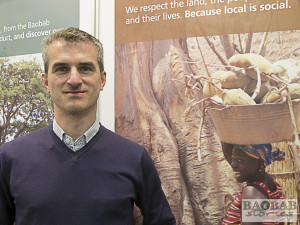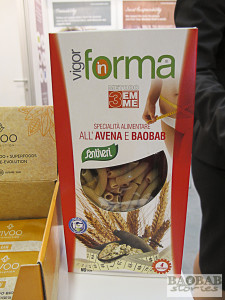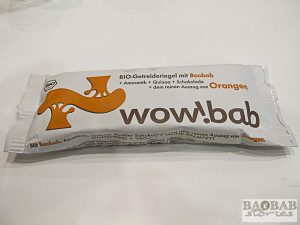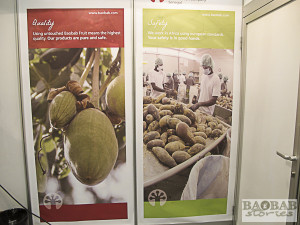Baobab has my full attention – I am at the Biofach, the largest trade fair for organic food in Nuremberg. I stand right in front of the booth of the Baobab Fruit Company – one of the first providers of baobab fruit powder an oil. The booth looks inviting and I have a thorough look at the products on display.
Baobab ice cream is available, baobab baking agent for pizza dough and even pasta with baobab in it! Then I see WOW!BAB – what’s that? Before my imagination can produce deceptive images, reality arrives: a baobab granola bar! The inventor, Frédéric Letellier, tells me about how he came up with the idea to produce a cereal bar from baobab fruit powder which is still widely unknown.
For many years he has worked in the food industry and was responsible for selling various fruit juices. Part of his job was to purchase exotic fruits. By accident he came across the super fruit.
At that time only a few pioneers attempted to make baobab internationally “acceptable”. Baobab was still largely unknown market-wise and not many people were interested. Things started changing for baobab with the approval of the fruit under the EU Novel Food Regulation in 2008. Since then it can be imported and sold legally.
Letelliers interest was aroused, he quit his former job and founded his company. Inventing and marketing a brand new product is challenging in itself. But that was not Letellier’s sole intention. With his commitment he wants to contribute improving the living conditions of the baobab fruit collectors. The fruit powder in the cereal bars comes from rural Senegal. The people there do not have many opportunities to make money. Harvest and sale of baobab fruits offer a new source of additional income.
Beneficial for the fruit collectors is not only the increase in terms of money – they do not need investments as they might for other crops. For baobab no seed material, fertilizers, pesticides or complicated harvesting machinery are necessary.
Baobabs still grow in abundant numbers, the fruit ripen on the trees and fall off as soon as they are ready. The trees do not grow on plantations like pineapple or oranges and are therefore not cultivated. The fruit are wild collections and harvest takes place between January and March near Tambacunda to the east, close to the border to Mali.
In former times the really tedious part of harvesting and marketing was transporting the fruit over long distances from the collecting places to the markets in towns or cities. Today this is organized by the Baobab Fruit Company. From there, Letellier buys his fruit powder. As one of the first companies in Africa South of the Sahara it has built viable logistics for transport and processing. The fruits are collected in rural areas and brought to factories for processing.
For the collectors, processing the fruit in accordance with high hygiene standards in food processing is very difficult. This is where the factories in cities come in: they maintain high hygiene standards to prevent the fruit powder from contamination. The fruit collectors have to ensure that only intact fruit without cracks in their shells are collected. In the factories, the fruit are opened and the powder is removed. Letellier states: “I was there and had a look at the facilities. One could almost eat from the floor. It is unbelievable, to find high quality food processing as that in Senegal.”
In a closing remark he states what makes baobab really special in his personal view: “I do not know of any other exotic fruit where cultivation and production cannot be relocated. If we want to work with baobab we need to go far into the savannahs and our efforts benefit those living under really dramatic circumstances. We talk about areas in Africa, which are extraordinarily poor. “




